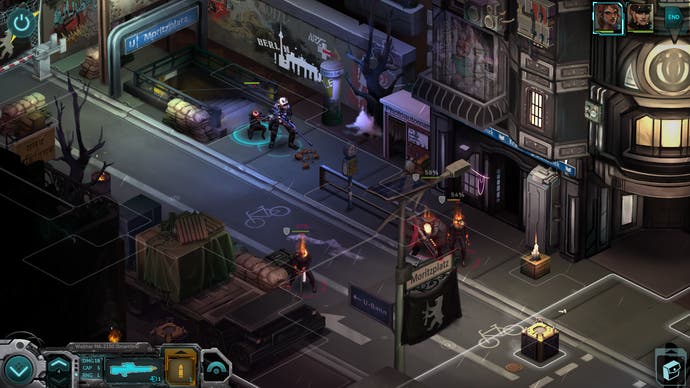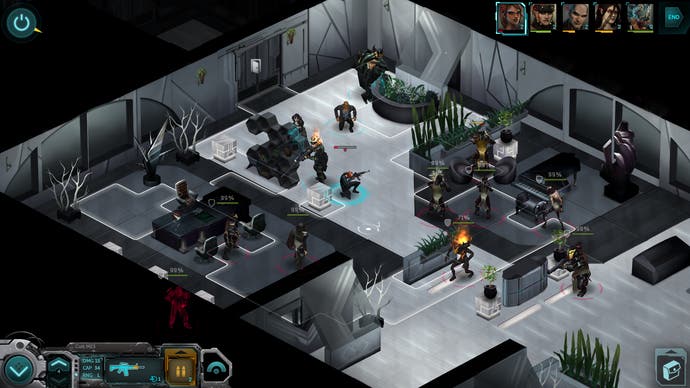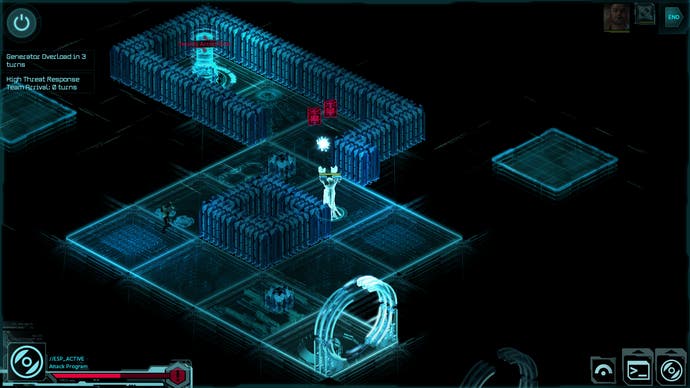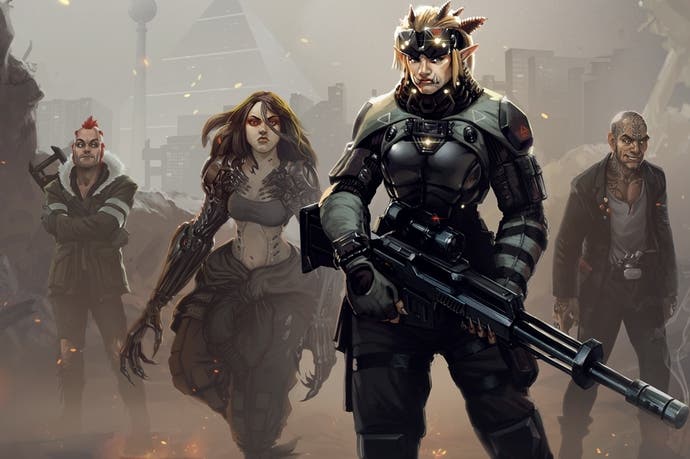Shadowrun: Dragonfall review
Nuyen improved.
Shadowrun Returns was a frustrating game for me. I wanted to love it but didn't even like it - not much, anyway. Its original campaign ranks as one of my bigger disappointments in recent years, feeling more like a Neverwinter Nights-style glorified engine demo than a game in its own right; its title ultimately sounded like a promise that one day Shadowrun might Return, even if it took the fans breaking open the included editor and Steam Workshop functionality to make it happen. Your mileage on this may vary, and if you dug its Dead Man's Switch campaign, great. I know, however, that I'm not alone in having been deeply underwhelmed.
I mention this not to belatedly put the boot in but because Dragonfall has proved to be such a pleasant surprise - exactly the kind of adventure that I was hoping the original would be, for the most part. It's an expansion rather than a whole new game, so some obvious caveats apply and we may as well get them out of the way now. The basic systems are the same, so if you bounced off the original campaign for those reasons rather than its story or linearity, expect similar problems here. Both magic and firearms still aspire to having the heft and raw destructive power of water pistols. The environments are still static, and the RPG side is much shallower than the complex world regularly cries out for it to be. The most notable core change is that you can now save whenever you like, though that feature can be buggy.

Those problems duly marked, Dragonfall isn't just a far better campaign than Dead Man's Switch, but a really enjoyable indie RPG in its own right. It's still primarily of the 'adventure with combat' style, and is ultimately quite linear. The illusion of freedom is much stronger, however, and the story more satisfying for it. Many more situations now make use of character elements like etiquettes (social options when you need to try and pull rank on a guard or call out a gangbanger) and character skills for forcing open doors, figuring out puzzles, or simply opening an alternate path with the help of a hefty shoulder-slam.
The biggest improvement, though, is an added sense of intimacy to the action, provided by a shift from being a solo operator to the new leader of a band of veteran shadowrunners with their strong team dynamic baked in from the start. This occasionally stumbles - the inventory system repeatedly demonstrates that the engine isn't really designed for full party mechanics, and frustratingly inconsistent skill checks only sometimes let you call on your friends for help with a tricky door or to share their expertise - but it generally works fine and provides a far more engaging experience than just having a team for convenience's sake.
Not too surprisingly, the main party members follow the standard BioWare playbook when it comes to slowly drip-feeding backstory and integrating their own problems into the action - but they do it well, so that's OK. Easily the best are Eiger, a rules-driven military troll, overlooked for leadership, who tolerates no s**t (but unfortunately considers your right to give her orders to be a steaming pile of it), and Dietrich, a punk-rocker turned shaman who gets one of the best lines in the game when asked if he can sing. Together with the help of a friendly hacker - because this is a cyberpunk game and so awful cyberspace bits are sadly inescapable - your ferocious four-or-so-some find themselves stumbling upon a conspiracy involving a long-forgotten dragon, all while trying to maintain order and make a variably honest living in the Kruzbasar, an anarchist district of Berlin that acts as both home and mission hub for most of the campaign.

The big plot is well handled, but it's in the smaller-scale storytelling that Dragonfall really finds its groove. The writing is excellent throughout, imbuing the functional visuals and sparsely populated screens with a sense of character and history. The world feels lived in, often more than it really deserves to, and there's a lot of it to explore. Much of the game is set up like the second chapter of Baldur's Gate 2, with your team having to raise a big bag of money to pay off a data broker for some crucial information, and the main story playing out during return visits to stock up and hit the net.
In another game, that structure might have felt lazy, with the various missions being quick and dirty and having little to do with the main story. Here, though, it fits: it's deliberately rough, endearingly pulpy and, most importantly, allows your shadowrunners to strut their stuff in a variety of morally shaded encounters that let them be freelance troubleshooters first, heroes a distant second. Even at their most honourable, they're primarily in this to save their own asses, and not squeamish about getting their hands bloody.
The missions themselves are extremely enjoyable, too. Each offers a relatively short trip to a new location with a handful of maps to work through, but there are lots of these and they all offer something different to justify their inclusion. All are very combat-heavy but with plenty of detail around the side, including ways to talk or sneak around a few of the fights, role-play potential via moral choices, optional extra assignments and ways to hack open additional paths (if you can stay awake long enough to finish the cyberspace bits). As before, fighting itself offers no real reward, with no corpse drops to scoop up and karma (stat points) being awarded for completing objectives rather than taking out enemies. You only get to customise your main character, with the rest of the team taking care of themselves without your help. Their reliable presence does, however, make it easier to focus on your build and safer to specialise.
"The scale feels right for a Shadowrun game, keeping the action primarily at street level, but with a big looming threat to make the main plot more than just another job"

Playing on normal difficulty, combat didn't pose too much trouble, with most fights following the same basic routine - especially as there's no reason to ever enter battle without your main team. There are plenty of encounters that do break the pattern and keep things interesting though, including a pseudo-escort mission where you get a super-powerful guest party member that enemies are constantly trying to hack onto their side, a race to defuse bombs on short timers that demands you split up the party for a while and a race to to get through an area after triggering an alarm. These are the highlight missions, though the only really tedious ones are the key hunts thrown in just to pad things out or whenever cyberspace is involved. Fortunately, that's not very often this time, with hacking primarily used as just another option, and the team's decker able to power through most of it with little fuss.
If you played and enjoyed Shadowrun Returns, Dragonfall is a no-brainer. It's more professionally made and superior to the original campaign in every way, and likely to clock in at around 12-15 hours depending on difficulty settings: enough to tell its story, but not enough to outstay its welcome. The scale feels right for a Shadowrun game, keeping the action primarily at street level, but with a big looming threat to make the main plot more than just another job.
Unfortunately, as DLC, if you didn't buy Shadowrun Returns originally you have to do so now to play Dragonfall - effectively doubling the price. It would be much easier to recommend as a standalone expansion - both as a marked improvement on the original campaign and a refreshing break from the genre's usual fantasy worlds. It still stands as those things if you're willing to take the plunge, though, as well as being an excellent reason to give Shadowrun Returns and its community a second look.

